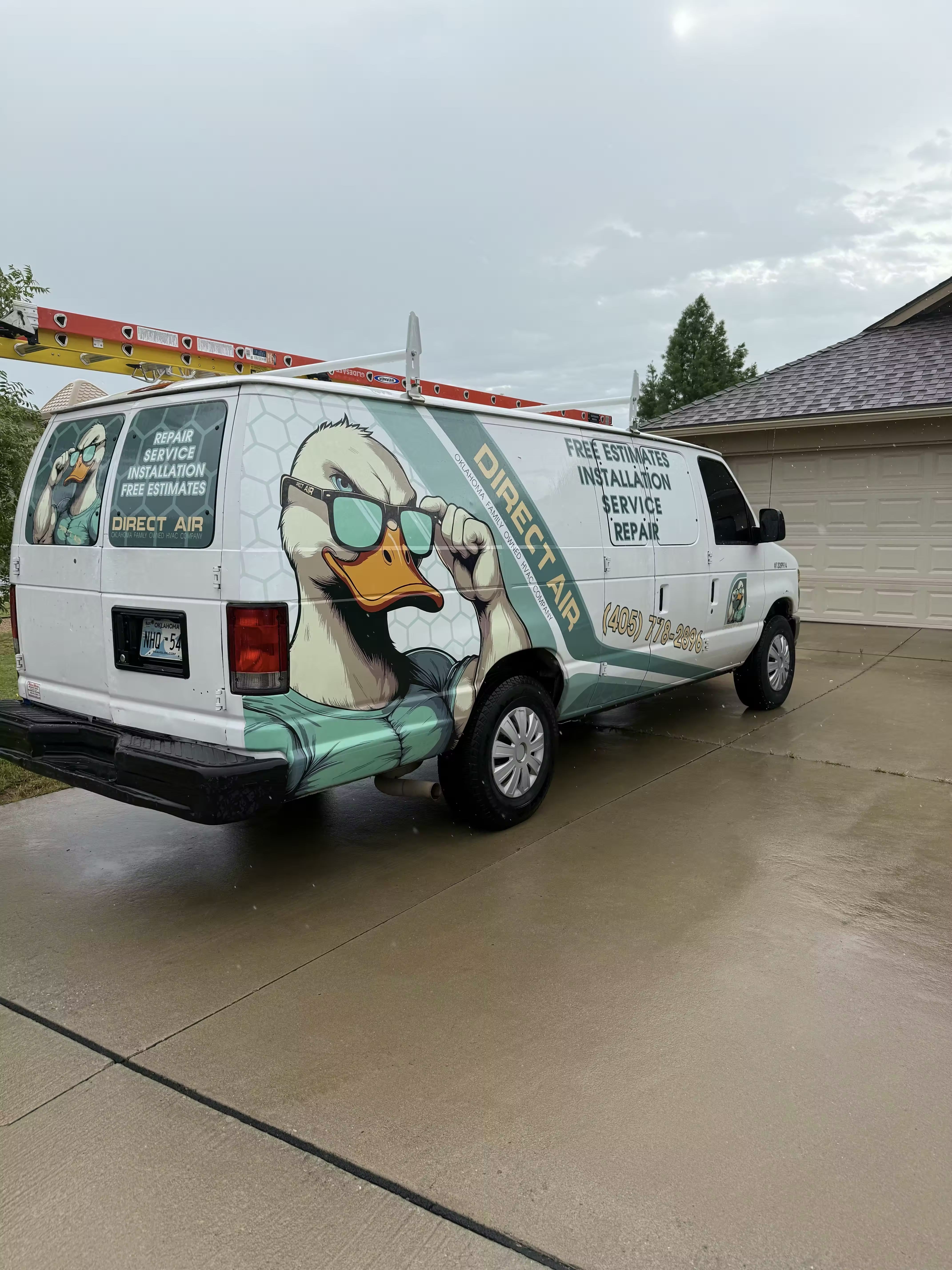Heat Pump Repair in Yukon, OK
-min.avif)

Professional heat pump repair in Yukon, OK is vital for maintaining home comfort and efficiency year-round. This guide outlines key warning signs your heat pump needs attention, including inconsistent heating/cooling, strange noises, or rising energy bills. Our detailed diagnostic and repair process addresses various malfunctions, from refrigerant leaks to electrical issues. We also provide expert advice on whether to repair your existing heat pump or invest in a new, more efficient system, helping you make the best decision for your home.
Professional Heat Pump Repair in Yukon, OK
For homeowners in Yukon, a heat pump is a cornerstone of year-round comfort, providing essential cooling during the hot Oklahoma summers and reliable warmth through the chilly winters. When this dual-purpose system falters, it can disrupt your entire household. A malfunctioning heat pump not only compromises your comfort but can also lead to soaring energy bills and the risk of more extensive, costly damage. Securing prompt, professional heat pump repair is crucial to restoring your home’s climate control, ensuring system efficiency, and protecting your investment.
Identifying the Need for Service: Common Heat Pump Warning Signs
Before a complete breakdown occurs, a heat pump will often display clear signs of distress. Recognizing these symptoms early allows for timely intervention, often preventing minor issues from escalating into major failures. Be attentive to these common indicators that your system requires professional attention.
Inconsistent Heating or CoolingIf you notice that some rooms are comfortable while others are too hot or cold, or if the air coming from your vents feels lukewarm, it points to a problem. This could be caused by low refrigerant levels, a struggling compressor, or issues with the reversing valve, which is responsible for switching between heating and cooling modes.
Unusual or Loud NoisesYour heat pump should operate with a relatively low hum. Sudden, loud, or persistent noises are a clear red flag.
- Grinding or Squealing: These sounds often suggest worn-out motor bearings or other internal mechanical failures that require immediate inspection.
- Hissing: A distinct hissing noise typically indicates a refrigerant leak, which can severely impact performance and damage the compressor.
- Clanking or Banging: These metallic sounds may point to a loose part, such as a fan blade or motor mount, that could cause significant damage if left unaddressed.
Sudden Spikes in Energy BillsA heat pump is designed for efficiency. If your utility costs unexpectedly increase without a corresponding change in your usage habits, your system is likely working harder than it should. This loss of efficiency can be caused by dirty coils, failing components, or refrigerant leaks.
Constant Cycling or Failure to Turn OnA system that turns on and off too frequently (short cycling) or runs continuously without reaching the set temperature is malfunctioning. These issues can stem from a faulty thermostat, improper refrigerant charge, or an oversized or undersized unit. Conversely, if the system fails to start at all, it could be an electrical problem, a tripped breaker, or a failed motor.
Ice Buildup on the Outdoor UnitWhile a thin layer of frost can be normal in winter, a thick accumulation of ice on the outdoor coil is not. This often signals a problem with the defrost cycle, low refrigerant levels, or restricted airflow, all of which hinder the unit’s ability to heat your home effectively.
Our Comprehensive Diagnostic and Repair Process
A successful repair begins with an accurate diagnosis. Our approach is methodical and transparent, ensuring we identify the root cause of the problem and provide a lasting solution. When you schedule a service, you can expect a thorough process designed to restore your system to optimal condition.
First, a skilled technician performs a complete system evaluation. This involves more than just looking at the obvious symptom. The inspection includes checking electrical connections, testing voltage, examining the thermostat’s calibration, and assessing the condition of the indoor and outdoor coils. The technician will meticulously measure refrigerant pressure to check for leaks or improper charging, which are common culprits in performance issues.
Once the diagnostic phase is complete, the technician will clearly explain the findings. You will receive a detailed report on the health of your system and a straightforward explanation of the necessary repairs. This empowers you to make an informed decision about your home’s comfort system. Upon your approval, the technician will proceed with the repair, using high-quality replacement parts to ensure durability and performance. After the repair is complete, the system is tested to verify that it is operating correctly and efficiently, restoring reliable comfort to your home.
Expert Solutions for All Heat Pump Malfunctions
Heat pumps are complex systems with numerous interconnected components. Our technicians possess the expertise to address a wide range of mechanical and electrical issues. Common repairs include:
- Refrigerant Leak Detection and Recharge: Locating and sealing refrigerant leaks and restoring the system to the manufacturer-specified charge.
- Compressor and Motor Repair: Addressing issues with the system's core components, including the compressor, fan motor, and blower motor.
- Reversing Valve Replacement: Fixing the critical component that allows the heat pump to switch between heating and cooling modes.
- Electrical Component Service: Replacing failed capacitors, contactors, and relays that control the flow of power to the system’s motors.
- Thermostat Calibration and Replacement: Ensuring the thermostat accurately reads the room temperature and communicates correctly with the heat pump.
- Defrost Control Board Service: Repairing or replacing the board that controls the defrost cycle to prevent ice buildup in winter.
An Informed Choice: Repairing vs. Replacing Your Heat Pump
A common question homeowners face is whether to invest in a repair or a full system replacement. Several factors should guide this important decision.
Consider the age of your unit. Most heat pumps have a lifespan of 10 to 15 years. If your system is approaching or has exceeded this age, a replacement may be a more cost-effective long-term solution than continuing to invest in an aging unit.
Evaluate the cost and extent of the repair. A good rule of thumb is to compare the repair cost to the price of a new system. If a single repair costs 30-50% of a replacement, investing that money in a new, more efficient, and reliable unit is often the wiser financial choice.
Look at the frequency of breakdowns. If you have had to schedule multiple service calls over the last couple of years, it is a strong sign that the system is becoming unreliable and more failures are likely.
Finally, consider energy efficiency. Technology has advanced significantly. A new, high-efficiency heat pump can offer substantial savings on your monthly energy bills, helping the new system pay for itself over time.

Financing
.png)







